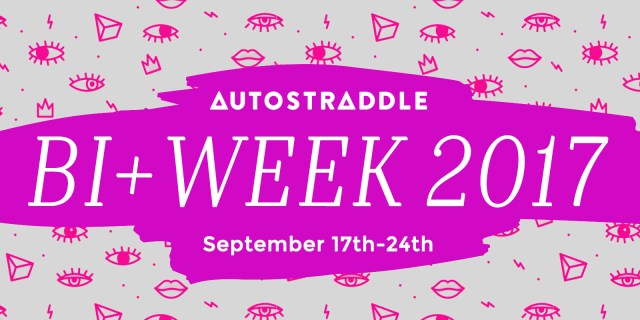
In the week leading up to what was initially Celebrate Bisexuality Day on September 23, we think a lot about visibility — characters in media who resist tropes, how we accomplish positive but nuanced representation, what it looks like to intentionally see and create space for each other, and looking at books and music that show us ourselves. Although it’s obviously crucial and beautiful, visibility is also complex! How do we want to be seen in our daily lives? How much control do we really have over it? How do we make ourselves visible in a world that often chooses not to see us clearly, and what risks and complications come with it? There’s no one answer, which is why we had all these Autostraddle staffers who identify somewhere under the bisexual umbrella talk about it for you!
Nora, Fashion & Beauty Editor
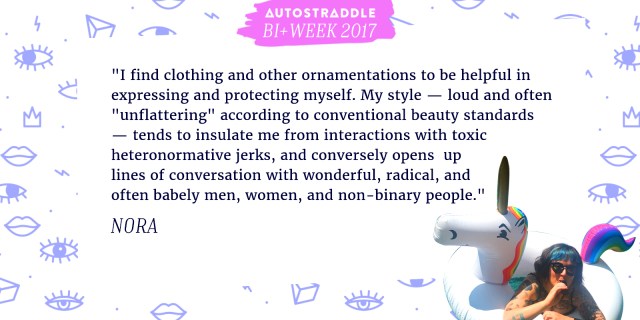
I don’t feel personally compelled to describe my sexuality in a single word or limited terms. The way I tend to phrase it to interested parties is that I am attracted to certain people regardless of gender, and that I feel lucky to have so many opportunities to give and receive love — though in a pinch, I’d say the most comfortable approximation of that sentiment is “queer.”
I ascribe this attitude largely to growing up in a family with two moms and a non-binary sibling, and in a social circle that knew and embraced us as such. My friends and relatives know I’ve dated people of different genders, but I’ve never had a real official “coming out”; I imagine that would feel more urgent had hetero and cis been presented as the default in my immediate community, the way they are in the world at large.
That said, I find clothing and other ornamentations to be helpful in expressing and protecting myself. My style — loud and often “unflattering” according to conventional beauty standards — tends to insulate me from interactions with toxic heteronormative jerks, and conversely opens up lines of conversation with wonderful, radical, and often babely men, women, and non-binary people. It’s a pretty sweet situation, if you ask me.
Mey, Trans Editor
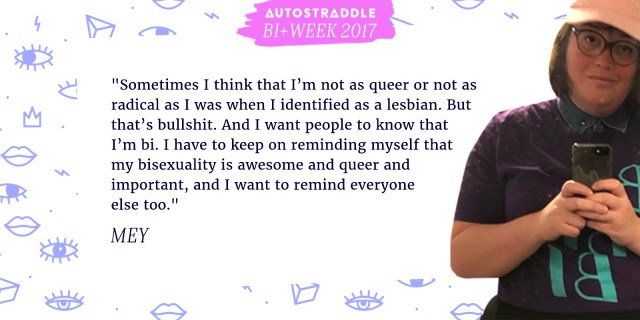
I’ve still not even been bisexual for a year, and I struggle a lot with internalized biphobia. Sometimes I think that I’m not as queer or not as radical as I was when I identified as a lesbian. But that’s bullshit. And I want people to know that I’m bi. I have to keep on reminding myself that my bisexuality is awesome and queer and important, and I want to remind everyone else too. So whenever I get the chance, I remind people by saying “Hey, I’m bisexual.” I love labels, and this is a label that’s very important to me, so I’m going to say it as many times as I can until it’s stuck in both my mind and the minds of everyone I talk to.
Stef, Vapid Fluff Editor
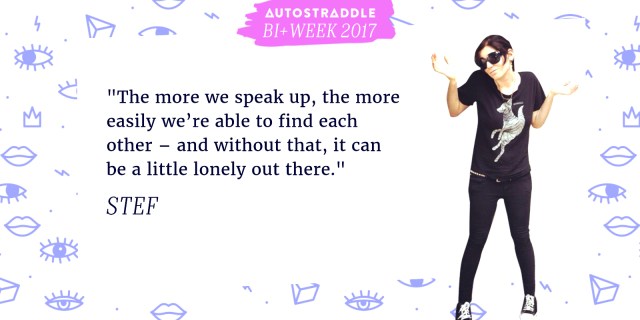
As a person who exists and writes on the internet, I do think it’s important to make myself extremely visible as bi/queer/etc. The more we speak up, the more easily we’re able to find each other – and without that, it can be a little lonely out there. I’ve been lucky in that I started coming to terms with my sexuality around the same time I met Riese and this website happened, so I never really had to go searching for an inclusive online queer community before we actively built this one.
I struggled enormously to come to terms with my sexuality in my 20s, and now in my 30s it’s still not necessarily something I can clearly define. I’ve mostly stopped trying to limit myself with labels, and over time I’ve found that to actually be pretty common (I will use “bisexual” or “queer” but have never found a term that particularly resonated with me). I will admit that it’s tricky sometimes helping my straight friends understand the language regarding my orientation that feels comfortable to me. I’ve also definitely had issues with partners who didn’t understand that my sexuality was/is real and valid. Interestingly enough, those partners are no longer around.
Laura M, Staff Writer
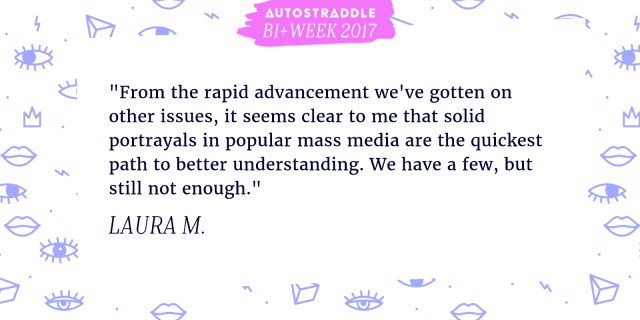
I feel like I’ve gotten much more chill about labels over time. I primarily identify as bisexual, but I find myself using “lesbian” and “gay” as adjectives to describe myself just as often. Outside of LGBT-specific contexts, I generally find any word that indicates “not straight” to be good enough. I guess I just don’t care that much if coworkers and casual acquaintances know the granular details of my life experiences and feelings? Broad strokes are fine, whatever.
Outside of my personal life, I do think it’s important to advocate for greater bi visibility in the media. People seem to have such a hard time with the concept, and honestly, it’s not that hard?! (Which is perhaps why I’ve ceased to care; it’s tiring to repeatedly explain myself.) From the rapid advancement we’ve gotten on other issues, it seems clear to me that solid portrayals in popular mass media are the quickest path to better understanding. We have a few, but still not enough. I would love to see more.
Crystal, HR Director
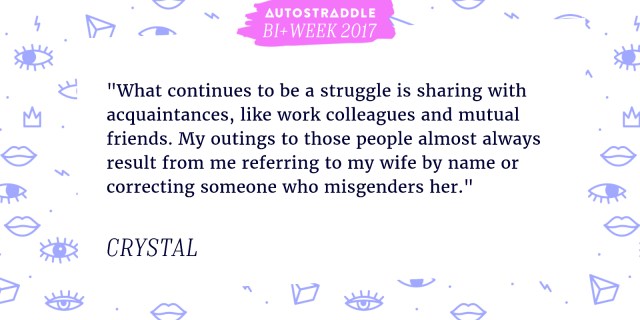
Visibility is important and so my preference will always be for people to know that I’m attracted to folks of various gender identities, although it’s not always doable. With friends and family it’s easy: I’ll either describe my orientation for them (these days I tend to avoid using any kind of label) or let them piece it together by being openly discussing past and current partners.
What continues to be a struggle is sharing this very specific information to acquaintances, like work colleagues and mutual friends. My outings to those people almost always result from me referring to Katie by name or correcting someone who misgenders her. It feels inappropriate to divulge more detail and so I don’t, even though I’m aware it may lead to incorrect assumptions about my orientation. I’m not certain there’s a work-around, I’m guess I’m still figuring it out.
KaeLyn, Staff Writer

I knew that “bisexual” was the word that made sense for me when I came out to my parents (in a fit of tears and teenage angst) at 17. I came out to the rest of the world a few months later when I went three hours away to my undergraduate college. Over time, and because of the times (early 2000’s), “queer” became a term that best resonated personally and politically with me.
I love the openness of being bi/pan/queer/whatever and the reality that who I’m attracted to changes over time and it’s totally natural and chill. I have a hard time conceptualizing monosexuality. Like, how? How can you just be attracted to one gender? I know it’s a real thing, but it’s bizarre for me to imagine ruling someone out based soley on their gender.
Since I came out-out to the world, I’ve always been out. I dated a straight cis guy for three years in college and I’m married to a gender non-binary queer boi now, so being visibly queer is not always easy. I’m femme-presenting, too, which doesn’t help. There was a time I felt like I had to announce it. Now, I just let it be a thing that is real and if people make assumptions, that’s on them. My partner flags as queer to other queer people, so when I’m with him, I feel very seen, but when I’m on my own, it’s a crapshoot whether that cute barista will know I’m flirting with her or not.
I flag queer in small ways. I have a fairly drastic undercut that I can cover or show off based on how I’m feeling on any given day. I choose to associate myself with queer things like writing for Autostraddle and serving on boards of LGBTQ nonprofits and being very visible in my social media presence. I don’t wear the bi flag on my sleeve and I don’t worry much anymore about how people see me, but I think that’s partly just getting older and more chill about life and giving less fucks.
The only thing that is sometimes weird is, being femme and bi, I can relate to other feminine women in a way that makes straight cis women assume I’m one of them and I don’t always like that. Even more than getting hit on by gross men, I hate feeling like I’m part of a straight sisterhood I don’t actually belong to. My favorite part about queer-exclusive spaces is that I don’t have to navigate that middle space aka talk to straight people at all.
Raquel, Staff Writer
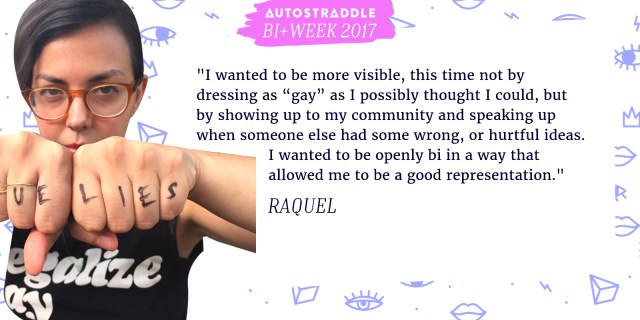
Over time, I’ve identified as many different things — heteroflexible was my first label, dipping my toe into the waters of multi-gender attraction but afraid to go so far in the lady pond that it would disrupt my life. Then, inevitably, it did—I fell in love with a girl and my world turned upside down. I didn’t know what to call myself after that for awhile, and I was just beginning to tiptoe into the world of gayness. I wanted to respect the fact that I’d just spent four years of my life dating a man, and years of my life before that with crushes on boys (and girls, but I hadn’t let myself look at that straight in the face, just yet). So, I tried “pan” — a term I’d learned on Tumblr, and a term I liked because I liked the ability to both have a label and be very vague about everything. (“I just like people” — thanks, Skins Series 5 Frankie!) Also, it reminded me of the creepy greek half-goat god, which for some reason I liked?
I even ended up starring as the token non-lesbian in a friend’s documentary short, with long mermaid hair and dressed in a vest and tie, explaining what “pansexual” meant — mostly, that it’s not so much about the parts as about the people. Pretty soon, I was trying my darndest to read as gay as I possibly could — I cut off all my hair and started to dress exclusively in doc martens and button-ups, usually also with suspenders, a tie, a vest, a blazer… (I definitely could have benefitted from Coco Chanel’s advice to “before leaving the house … look in the mirror and remove one [or two or three] accessory”).
After I’d been in the gay community for awhile, however, I started to meet other queer and bisexual women who talked to me about why pan was a frustrating label for them, and how important it felt for them to identify as Bisexual, openly and politically. I learned that it was shitty to call it transphobic — and actually, the “bi” refers to having an attraction to both your own sex and other sexes — making it not inherently transphobic, but just as inclusive as I thought pansexual was. This is my opinion — I still have friends who like “pan” as a label as well — but to me, it started to feel unnecessarily academic, niche, and thus standoffish, like I was using the term just so I wouldn’t use bi, and so I could be using a term other people couldn’t understand. I didn’t want to be that person.
I started to want to be bi, open about it, and smarter than the people who gave me shit for it.
And I had started to get shit for it. I was accosted for threesomes, accused of being in a phase, asked if I’d “go back to dick when we break up” and what my “percentage” of preference was—i.e., 50 – 50 gals and guys? 60–40? 80–20? (The answer is, 0% for you, asshole, and what a stupid, binarist, and erasing question. Go buy me a drink and go away.)
Interestingly, being called bi by others as a slur made me start to think harder about why I felt negatively towards the term. It make me look at my internalized biphobia. I wanted to be more visible, this time not by dressing as “gay” as I possibly thought I could, but by showing up to my community and speaking up when someone else had some wrong, or hurtful ideas. I wanted to be openly bi in a way that allowed me to be a good representation.
At the same time, I love having a glut of terms I can use interchangeably. I love the term “queer,” which I usually use as a more umbrella term, to include myself amongst other women and non-binary folx who like women and non-binary folx (and men and whomever else they damn like). It’s the term I started using on my twitter and other social media, and the term I use to self-identify as a member of a community (as opposed to my specific, personal identity, for which I still like “bi”). I like identifying as, like, “sooooo gay, dude.” And I like being bi, regardless of who I’m dating or not dating at the time.
Added bonus? So many good puns. Bi, bitch.
Audrey, Writer
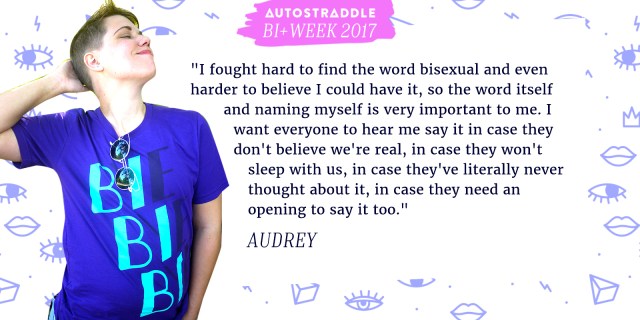
I fought hard to find the word bisexual and even harder to believe I could have it, so the word itself and naming myself is very important to me. I spent so many years loving boys and kissing girls and wearing my denial and confusion like chain mail — full of holes and yet still so powerful. In the five years since I first uttered the words “I’m bisexual,” I’ve taken great joy in proclaiming them fiercely. I want everyone to hear me say it in case they don’t believe we’re real, in case they won’t sleep with us, in case they’ve literally never thought about it, in case they need an opening to say it too. I use other words also – I identify as queer, I appreciate the cultural shorthand of gay, and I’ll call my behaviors or clothes or social circle “so lesbian” when the occasion calls for it. But if I ever suspect there is a seed of doubt or erasure, I butt in: “Actually, I’m bisexual.” It’s simple, and so far it’s never caused anyone to yell at me, and it’s the least I can do to maybe make things a teeny bit easier for those who are still out there searching for the word.
Natalie, Staff Writer
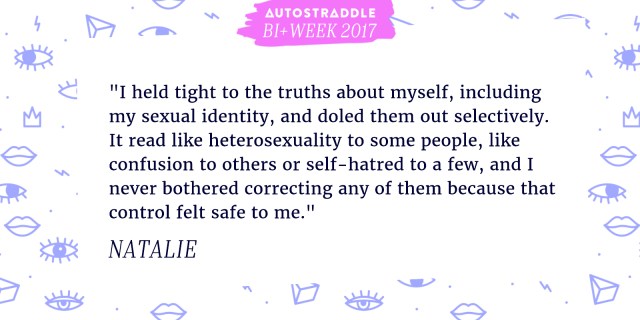
For most of my life, I’ve been particularly good at making myself invisible. It was an instinct borne from surviving sexual assault… a way to regain the control that had been stolen from me. I held tight to the truths about myself, including my sexual identity, and doled them out selectively. It read like heterosexuality to some people, like confusion to others or self-hatred to a few, and I never bothered correcting any of them because that control felt safe to me.
But as I began to heal from the trauma, I started to cede some of that control and my grip on those truths began to loosen. My attraction to women was, surprisingly, easier to accept than the realization that my attraction to men hadn’t ended that fateful night. I told the people I cared about most… and, at some point, healing and establishing visibility as a bisexual woman became invariably linked. Both remain daily pursuits.
There’s still a lot about visibility that I don’t have figured out yet. The conversations between me and potential romantic partners have gotten easier but the everyday conversations… those conversations — with straight and queer audiences alike — which are completely avoidable, yet probably necessary to create a better space for bisexual people? Those conversations are fraught and require far more energy and patience than I often have to give.
Araguaney, A-Camp Staff
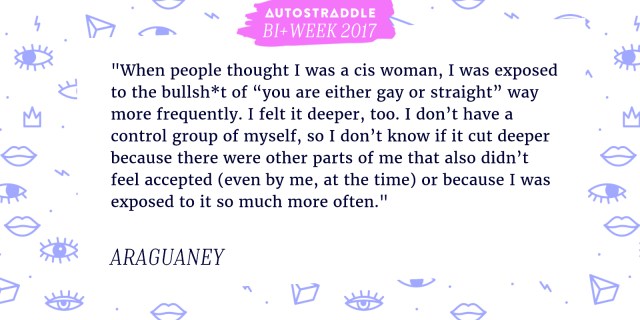
I very rarely think about visibility. More specifically, I rarely think about my own. I think it is because I’m consistently outing myself by virtue of my gender, and so with that in/visibility has been normalized as a daily practice, as routine as taking a shower. I’m genderqueer and my pronouns are they/them, so if I want to go through a meeting without feeling like I might suffocate I have to out myself from the get go. In/visibility is just routine. I say my name, I say my pronouns, I say my title, I get going with my meeting, presentation, etc. This is not to say I don’t think about safety on a daily basis, to varying degrees according to the environment, it just doesn’t manifest as a sidekick to visibility.
I used to think about my own visibility way more when I wasn’t out as genderqueer. When people thought I was a cis woman, I was exposed to the bullsh*t of “you are either gay or straight” way more frequently. I felt it deeper, too. I don’t have a control group of myself, so I don’t know if it cut deeper because there were other parts of me that also didn’t feel accepted (even by me, at the time) or because I was exposed to it so much more often. What I can say is that doesn’t happen nearly as frequently now that I’m out daily as a genderqueer person. It’s like the idea of sexual orientation is out the window once we come in with a fluid gender identity.
Are all genderqueers, queer? I do wonder, if a genderqueer person is only attracted to people of a gender other than genderqueer — does that make them heterosexual, by definition? I am by no means advocating labeling other people, just thinking out loud if the same rules of sexual orientation apply to genderexpansive folks like me, and whether other genderqueer folks have thought about this too. With a gender so happy to be outside the binary, how do we relate to words that were created with only binary identities in mind?
I don’t have an answer to that yet, and I’m excited to see the definition of words to continue expanding to include us. In the meantime, while I think this through, I can let you know it is my loud mouth that keeps me visible everyday.
Rachel, Managing Editor
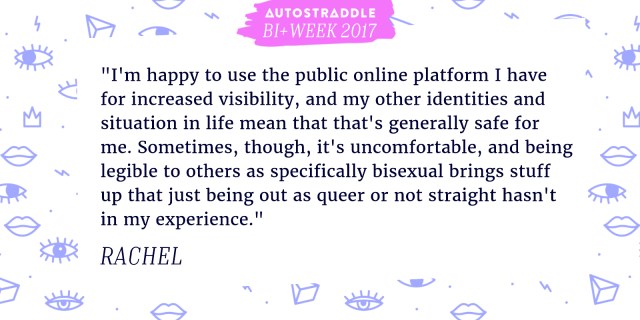
I’m in a unique position as far as my visibility as an out bisexual person because of this job and the website you’re reading this on — although my presentation and visual markers are such that in the “real world” I’d usually be read as straight woman, but my “real world” is an online one where both me and my identity are highly visible in specific ways. In some ways that’s been really positive — it relieves me of the burden of constantly making choices about my visibility and having to come out at least in some ways constantly and to everyone. On the other hand, in some ways it sucks — it takes away choices about my visibility, because anyone who knows what I do for work or who googles me can find out a lot about my experiences and how I identify.
Most of the time that’s totally fine; I’m happy to use the public online platform I have for increased visibility, and my other identities and situation in life mean that that’s generally safe for me. Sometimes, though, it’s uncomfortable, and being legible to others as specifically bisexual brings stuff up that just being out as queer or not straight hasn’t in my experience — I’ve had a lot of specific interactions with a lot of people making assumptions about my relationship to monogamy, about my sexual history or availability, my relationship to the rest of the queer community, a whole range of truly bizarre things. When possible, I like having a little more control over how I’m read and who I make myself legible to; Natalie’s thoughts on wanting to maintain a dynamic of control over how others see you really resonated with me. In real-world interaction I find myself often reaching for cues or forms of communication that will resonate with other queer people but not straight people — a classic vagueness around the pronouns of former partners, etc. I’m sometimes ambivalent around concepts of visibility (I wrote a whole essay about it). I definitely wholly understand the importance of as many visible and authentic bisexual identities as possible, but I sometimes feel concern about a certain flattening of me and my community — I worry that when I identify myself as bisexual specifically, I can feel other people’s expectations and connotations related to that identity suddenly superimposed onto me, and they can be exhausting to navigate. At the end of the day, though, I think that’s a challenge that can only be addressed with even more depictions of us, more varied and authentic and complicated visions of us that make the weird cookie-cutter ideas of us that people have obviously and inarguably absurd.




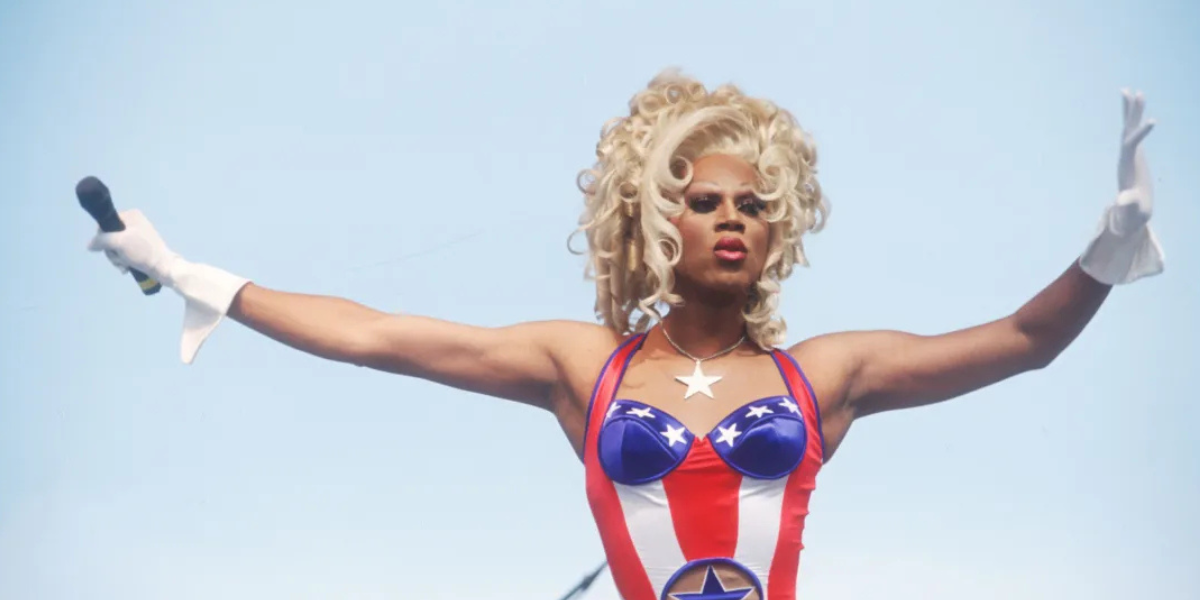
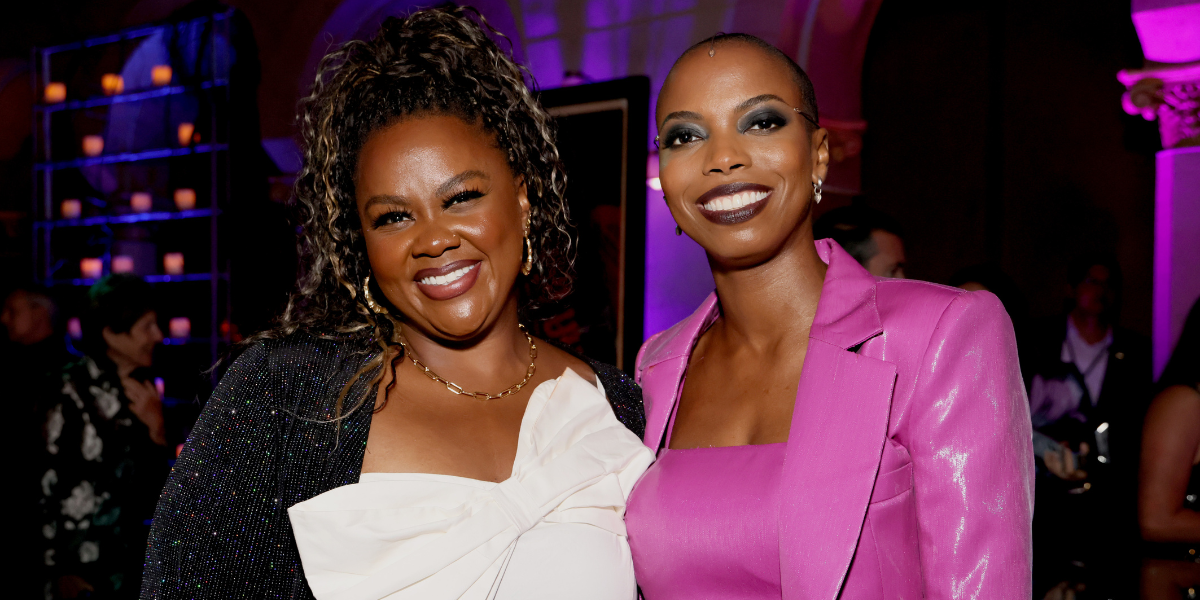
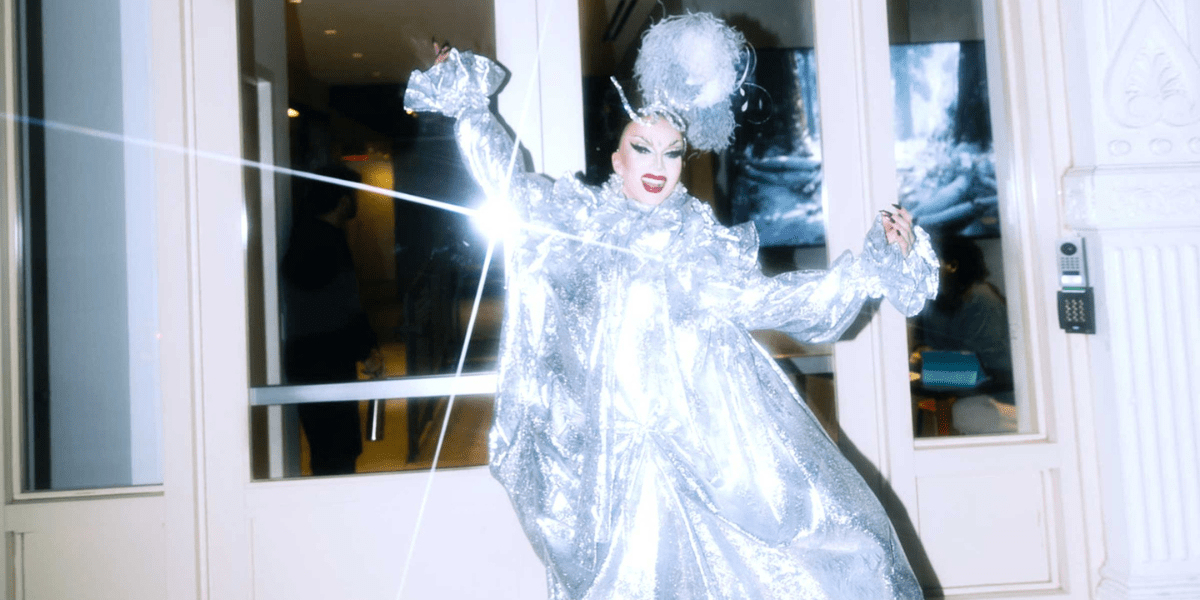
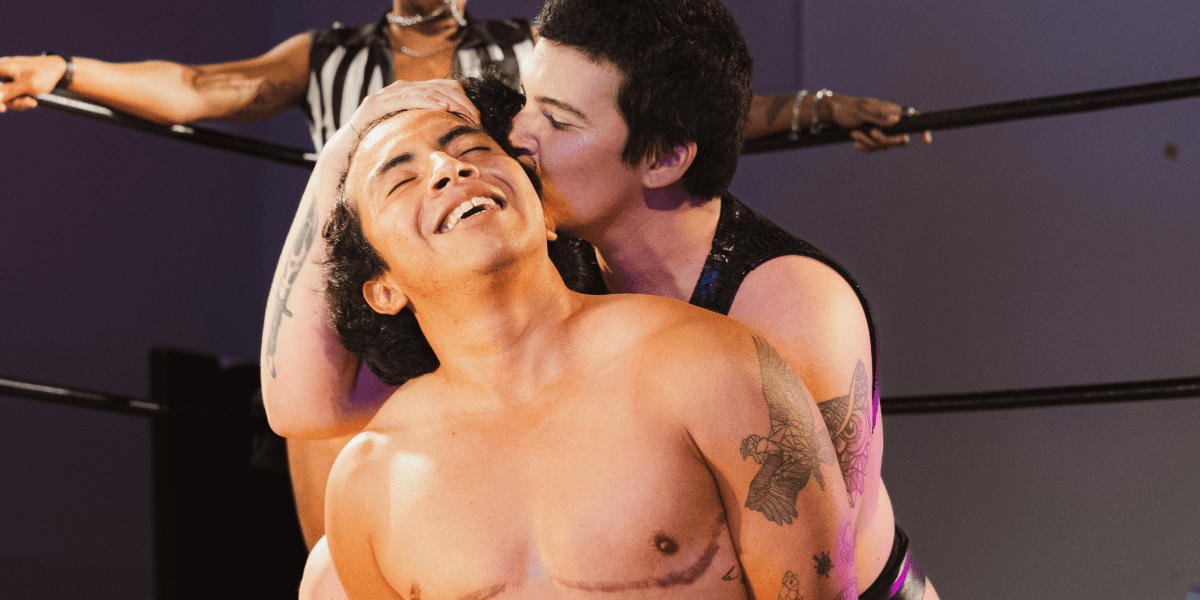
Comments
I really appreciate all of this, and Autostraddle’s continued dedication to elevating the bisexual identity, voice, experience (in that it is incredibly varied and diverse)(in that you do this while still elevating almost all of the other identities and experiences in the LGBTQIA+ umbrella).
I had…zero? role models to look at when I was growing up and figuring out that I was bi/queer. I’m so happy that’s pretty much no longer the case, even if we (as a society) still have a long ways to go. Progress, anyway. Everything counts.
Fun story: I initially convinced myself that I couldn’t be bi/queer because my older sister had already come out as bi and I was sure 1) you couldn’t have more than one queer person in a family, and 2) everyone would just accuse me of copying my older sister. :P
I also somehow convinced myself that I needed to date a guy first, and that if I dated a woman first it would somehow forever pigeonhole me as a lesbian (and that that was bad? and/or that other people could force me into an identity that wasn’t/isn’t mine?). So then I just didn’t date anyone until I was 22.
That must be so fun to have a bi sister!
It’s pretty damn fun! She took me to my first Pride parade when I was like 14 or 15 years old, and my first gay bar, and first drag king shows, and got me involved in doing drag kinging/performance art, and so on and so forth.
Really, I guess my sister was my first queer role model. :) <3
Oh my god, I did that too! I spent literally years of my life telling myself that obviously I wasn’t bi because my (slightly younger) sister had come out as bi, and I thought it was statistically unlikely that there could be more than one bi sibling in a family.
Of course, if I’d actually been straight, I don’t think I’d have needed statistics (that I’m pretty sure I made up??) to convince myself I was straight, lol.
And then one day I noticed that all my best friends were lesbians and I had a giant crush on one of them. At which point I finally said to myself: “hmm, maybe…maybe I am bi…after all?”
In the immortal words of Rachel, Real L Word episode 208, “You know what Mom, you might do hair to be like me, but you don’t eat pussy to be like your big sister.”
This is so great. I have been loving all the bi content this week, it makes my heart so happy!
I really identify with what Kaelyn said about “being femme and bi, I can relate to other feminine women in a way that makes straight cis women assume I’m one of them and I don’t always like that.” I had this coworker who was constantly making these comments to me that I could tell was her trying to straight cis woman bond with me and it was so awkward! One time she asked me “Aren’t you just so excited to have his Mexican babies?,” referring to my cis Mexican boyfriend. WTF??
I’ve also had many of those experiences that Rachel has: “people making assumptions about my relationship to monogamy, about my sexual history or availability, my relationship to the rest of the queer community.” It’s so weird to know intellectually the assumptions that are made about bi people but to still be thrown when people in your life apply them to you!
Yes! All the bi content this week has been totally A+!
Thank you all for this post! Araguaney, I’ve had the same question if a genderqueer person is only attracted to another gender. Most people I’ve spoken to said no, because your gender is queer you are by definition queer or you don’t fall within the binary.
Cool! Yeah, I feel that so deeply it’s like my mitochondria is yelling “queer! queer now, queer forever” -which is to say, I’m in total agreement.
my mitochondria are yelling* oof, typos.
I know my gnb partner has thoughts about this that are really only his to articulate, but I can tell you he is monosexual (100% only attracted to women) and definitely identifies as queer.
Yes! Yay! Thank you for your comments @kaelynrich and @needlesandpin <3
I've been giving more thought to this, and I think I didn't express myself accurately. What meant to ask is if as genderqueer folks we get to access labels other than "queer" by default, not whether we want them ('cause I assume some of us do and some don't and that is the beauty of being us). Like, could a genderqueer person actually access any hetero privilege by virtue of being a monosexual person attracted to a gender other than their own? Can folks whose gender is a manifestation of queerness actually meaningfully engage with labels that didn't have us in mind?
That was more like it, as a follow up thought to the bisexual label being pushed further away from my grasp after I came out.
<3 <3
Yes, we can all shout it together!
Question to all the bi folks here: how do you go about letting new people and acquaintances know you’re bi?
I’m not sure whether I’m gay or bi, and I have been out as both at various points in my life, but if it turns out I am bi, I really don’t want to keep on lying by omission – with potential new friends my sexuality would always become obvious pretty soon, but with acquaintances in situations outside of lgbt/lgbt-friendly circles (eg work colleagues, family friends etc) with whom I’m not exactly going to be discussing my personal life, how it generally goes is they ask if I have a boyfriend and I simply say no, and they go on assuming I’m straight.
‘No, I’m gay’ flows whereas ‘No, I’m bisexual’ doesn’t make any sense, and I feel like straight people often find a casual mention of bisexuality (eg if I were to say, ‘no, and by the way I’m bisexual’) somehow oversharing or inappropriate, perhaps because they view it as inherently sexual.
Some people might not mind being assumed straight by people they aren’t close to, but for me personally, I only want to date women and can’t imagine myself ever with a boyfriend – if I am bi I have a very strong preference for women and it feels so uncomfortable to be assumed to have an identity so far from my own. I’m just curious to know how others navigate this.
It started as a day but y’all have made this a happy bi week. Thx! :)
I’m terrible at casually coming out in conversation, so it’s hilarious to me that I think I can answer your question.
But. What about saying “No, I’m queer” instead of specifying gay or bi? Not all straight people are familiar with queer and all of it’s meanings so you might confuse some people, but it’s a pretty good way to say “I’m not straight.” Or you could just say, “no, I’m not straight.”
Your last paragraph is almost exactly how I would describe my situation. In addition to cleo’s suggestions, maybe something like “No, I’m not really interested in dating men”? I’m rarely brave enough myself to come out in the moment to casual acquaintances, so I can’t speak from experience, but that seems like it might be the easiest way to get your point across without using a specific label.
You could try ‘no I’m not dating anyone at the moment’ if you’re not. They might still peg you as straight but it could make them think. And obviously ‘no I have a girlfriend’ or ‘no my partner is non-binary’ for if you actually are dating someone who happens not to be a boyfriend
How about this: “Do you have a boyfriend?” “…or a girlfriend. No, not at the moment!”
Thanks for this. I really appreciate all of the bi coverage this week and the willingness of everyone to talk about it.
I never thought about bi visibility until a few years ago when I realized that my bi-ness had become invisible. I’m 47, I’ve been with my (cis, het) husband for almost 17 years, I’m a pretty private, reserved person and even though I’d come out to my family and friends when I was 21, I kind of stopped talking about my dating history once I got married. And then I heard about the It Gets Better Project and I was so enthusiastic – I wanted to make a video and then I realized, oops, I’m not really out anymore. So it’s like I woke up a few years ago and realized that almost everyone in my life assumed I was straight and it felt really, really uncomfortable.
So I’ve been slowly experimenting with being more visible. I started by being visible online (here and on The Toast and a few book blogs) and moved into attempting to find queer spaces / groups – I joined a couple queer and queer friendly book groups and started volunteering at a local LGBTQ+ center.
For me, at the moment, it feels more important to be known and seen by key people in my life rather than by everyone. I’m currently freelancing / working contracts and I’m out to some people at some jobs (mostly to fellow queer people but not exclusively) but I’m not out at every job. I’m out at my church and I’ve marched in the Pride Parade with my parish (and diocese!- I’m so incredibly proud to be Episcopalian) for the last 3 years. I’ve come out or re-come out to a few key family members.
I’ve also realized that I am terrible at coming out in conversation. Terrible. As I’ve started talking more about my journey to reclaim my bi identity, I’ve realized that some people I came out to previously didn’t take it very seriously. And I’m not sure if that’s because of bi-erasure and me being married to a man or that sometimes I think I’m clearer than I actually am or a combination. I bravely told my favorite cousin that I’m attracted to women as well as men many years ago and then more recently I said something in passing about being bi and she was like “hold up! I don’t think you mentioned that before.” And she did remember me telling her about liking women too, but somehow calling myself bi seemed like a different thing than liking women to her.
I’ve started wearing a rainbow pride pin on my purse and that has the advantage of letting people start the conversation when they compliment me on it. I make a point of wearing my bi pride pin whenever I volunteer at the LGBTQ+ center – I started doing that so I could mention my husband without feeling like everyone was going to assume I’m a straight ally but one what I’ve found is that it helps me find other bi+ people and that has been a huge blessing.
Glad to see this comment, and that you’re part of the conversation.
I’m glad to read this. I’m also married to a cis/hetero man and have been with him for almost a decade. I’m also going through the process of re-coming out. It sounds like you are doing some great things!
Solidarity! Re-coming out is so weird. <3 <3 Good for you.
I look so young that any sexualish sounding comment from me runs the risk of being met with shock from eavesdroppers, same as when I swear. Even when it looks like a young teen girl crushing on a boy… Especially if I hint at a sex life. But I’m 29 and I’ve had experiences and I feel attraction. The world expects me to have a romanticised heterosexuality with no sex attached.
In reality, I’m bi/pan/no labels. I like women, nb ppl and pretty boys but I’ve dated guys who fit none of those categories. My gender flips about as does a lot of other things, but I do still go through some extreme phases so when I’m attracted to guys I find it hard to remember I was once into girls and vice versa. I still crush heavy, I think that’s an aspie trait, but I’m happy either being single or with someone low maintenance who doesn’t push me into being with them all the time like the straight men I’ve dated do.
My fashion is so very ‘me’ (also butch) that I’m sure ppl assume I’m ace even when they know I’m nearing thirty as I’m not interested in dressing for others, whether that’s in a dress or in suits. I went through a very lesbian fashion phase (checked button up shirts) at sixth form & all I dated there was guys so I’m pretty sure fashion doesn’t make ppl think of me as gay.
My relationship with visibility is complicated (because clearly, I needed more of that in my life). Like many other bi folks I know, I’m married to a straight guy. I’ve been in this relationship for pretty much my entire adult life. When I’m out with him, I get assumed straight, because man. But for every other context in my life, especially my young life, I get read as lesbian because of being so overtly butch in my dress and manner. As a teenager it really got to me, because I was annoyed that anyone else felt it was their place to define me, and I hated the implication that they knew something about me that I didn’t. See, back then, I thought I was straight. Maybe I “should” have known better because the first person I ever fell for really hard was a girl, but I found my attraction to guys earlier and much more strongly, so I didn’t quite “get” it (and I think that 16-year-old me can be forgiven for not entirely understanding everything about herself just yet). So I didn’t even identify as bi to myself until I was in my mid-20s. It was a thing I danced around, like, “yeah, maybe I’m flexible, maybe I could have been into girls, but I’m lovingly partnered so it doesn’t matter”. I also believed that my orientation was a private matter, not anyone’s business anyway, so while I could acknowledge to myself that pretty ladies gave me pants feelings, I didn’t think I needed to talk about it.
Things changed while I was at a university that was notorious for being hostile to LGBT people (it was once ranked #3 most gay-unfriendly school in the country). I’m happy to say that things there are better now, but back before 2010 that was not the case. Seeing young queer people struggle in that environment pushed me to be more open about my bisexuality so that if nothing else, I could be a source of support. It ended up mattering, at least to the few students who came to talk to me about it, and maybe to some others I’ll never know about.
Now I’m at a new university with a fancy new job that seems like it was made just for me…another southern, very conservative school. I haven’t even been here a month, so I’m still figuring out “how to be”. Should I be “out”? Does it matter? Will I try to be a resource for the students here? Is that even my place (I’m not a professor, though I technically count as faculty)? All my coworkers know I’m married. But I’ve taken to wearing a tie to work. How do they take that? I really don’t know, folks. Fortunately I’m not pressuring myself to figure all of it out Right Now, but yeah, work is weird. It’s hard enough to define my role and my responsibilities in this, Kat’s First Shiny Adult Job.
Presenting in a way that gets read as queer feels really important to me right now, as someone who is also married to a straight guy. I am OK with dresses, etc., and I have been told I get read as queer in most situations by people who might be thinking of it (otherwise I work live among super-normy non-young people). I’ve been wearing more button ups and men’s style shoes and cut off most of my hair and it’s been helping me feel visible, which has been nice. I feel just as comfy that was as I do in a skirt or whatever so it’s nice to have that flexibility.
I don’t think anyone has ever articulated so precisely what it felt like being a bi teen/youth:
“I spent so many years loving boys and kissing girls and wearing my denial and confusion like chain mail — full of holes and yet still so powerful” – Thanks @audreyfaye! I miss you and your words so much!
Thanks everyone for being so awesome ^__^ I’ve known I was bi for a while, although for the longest time took issues with labels because “bi” seemed non trans inclusive, but “pan” seemed to unspecific. But like Raquel mentioned, the bi umbrella is actually a lot more inclusive than I first imagined, so now I feel comfortable using that label too. I can also relate to Mey’s feelings of not feeling “queer enough” as a bi person.
Even in super inclusive spaces like Auto Straddle, I still feel a sense of loneliness or “otherness” around my sexuality — not because of the people here, but more likely this is me continuing to shoulder stigma and expectations I’ve grown up with surrounding what bi-sexual looks like. And the more bi people I meet, the more it helps to shatter these ridiculous cookie cutter ideas.
My own sexuality is still so fluid, it’s hard to put a label on. I read somewhere that up to 40% of trans women experience a change in their sexuality after starting HRT. But sexuality can be fluid for all sorts of other reasons, evolving as we move through life stages or our relationship needs change. This fluidity TERRIFIED me at first. I was so used to simultaneously being attracted to both men and women. Then, one day — POOF! The attraction to men was gone. It was weeks before I realized that was once a reliable part of my identity now came in non-predictable phases. I can now go whole months without being attracted to men, but it always seems to come back, even if only for a little while.
One thing I’d like to do this next year is to be more visible — both with my sexuality and gender identity. I’m already fairly visible in online spaces, but I’d like to start wearing pins or branch out with my wardrobe to better express who I am. This comes with a lot of risk for someone like me. As a trans person in a conservative community, part of me still wants to blend in for fear of my safety. It’s a scary world out there, but if I feel like if I’m not visible, then things will never change. It has to start somewhere.
Saga! I always enjoy your comments and this one made me really emotional. Like, I’m so proud of you for wanting to be more visible but also like, it’s OK to protect yourself too. <3 <3
I started with buttons too – I think buttons are a great way to start being more visible IRL, especially the flag buttons. It took me soooo long to get comfortable wearing buttons in public (like maybe a 1 or 2 years and I still feel anxious sometimes) – I started with a bi-pride flag pin (just the colors, no words) and I felt so exposed the first few times I wore it – and I wore it to queer events that felt relatively safe at first. I was both relieved and kind of annoyed when no one seemed to notice or care the first couple times I wore it. Same with wearing a bi-pride flag t-shirt to Pride. And now I have a rainbow flag pin permanently on my bag / purse and I'm planning to get a bi-pride pin that won't keep falling off so I can wear that too.
I live in a big city in a queer friendly area so I'm in a much different situation than you – but one of the surprises for me is that wearing my bi pride flag has made me notice other people's pride pins and other gear too – so it's helped me find community. I don't seem to look queer enough to get those "I see you nods" that I've read about on AS but I take the "I like you button" comments as "I see you."